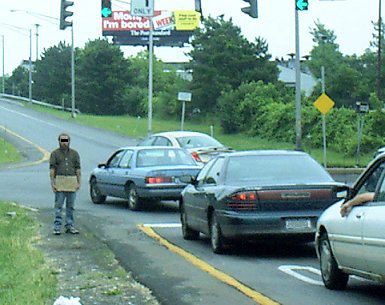 If you operate or travel in any urban or suburban area, you will encounter street beggars. Street beggars are a security threat because, more often than not, the average panhandler has mental problems, chemical abuse issues, or both. This makes the average panhandler erratic, unpredictable, and potentially violent. Combine this with the nature of the interaction – the street beggar is demanding to benefit from what you have earned, no matter how politely or elaborately he phrases the request – and every panhandling encounter is a potential “street interview,” a precursor to assault.
If you operate or travel in any urban or suburban area, you will encounter street beggars. Street beggars are a security threat because, more often than not, the average panhandler has mental problems, chemical abuse issues, or both. This makes the average panhandler erratic, unpredictable, and potentially violent. Combine this with the nature of the interaction – the street beggar is demanding to benefit from what you have earned, no matter how politely or elaborately he phrases the request – and every panhandling encounter is a potential “street interview,” a precursor to assault.
I write often on this issue because street beggars are easily the security threat with which I deal most often. (Barely a week goes by in which I do not have a new panhandler story to add to my collection. This is the result of regular trips downtown and nothing more provocative than that.) While many beggars are honest enough simply to bark at you for your money without pretext, many others use a variety of ploys designed to gain your sympathy or allay your suspicions.
Common beggar ploys have one thing in common: they are all, pardon my language, bullshit. The following indicators are by no means an inclusive list, but they serve as a great thumbnail guide to some of the more common street lies. All are ploys with which I’ve been confronted personally. Granted, there are people out there whose hard luck stories are actually true, but they’re much fewer and farther between than many people think.
Too Much Information
This is the big one, the ploy indicator most frequently encountered. Liars and beggars almost always fail to keep things simple. They launch into incredibly involved stories on the theory that the more detail they include, the more plausible the ruse will seem. This is not the case. A good liar keeps things simple because this leaves fewer traps to remember and avoid.
A young man wearing gold chains over a muscle shirt once gave me an elaborate song and dance about needing money to make a phone call because he needed a ride to some outpatient cancer treatment center, an appointment he’d missed previously due to a number of factors (which he supplied). The whole pile of nonsense was obviously an excuse to separate me from my money.
Gas Money
Apparently we are in the grip of a nationwide epidemic of stranded motorists, all of whom just need two or maybe five dollars worth of gas to get them on their ways again. The only cure for this epidemic is the kindness of strangers, it would seem, for this army of stranded motorists is even now wandering the streets, asking passers-by for help. Almost every time you encounter this request, it’s bogus.
Lunch Money
I recall a study some time back – it might have been in USA Today or some other major media outlet – that speared a popular myth. Most of the “homeless” carrying signs saying “will work for food” actually wouldn’t when offered the chance.
Take a good look at the next beggar who asks for money because, he tells you, he’s hungry. He doesn’t look like he’s starving, does he? He looks dirty and unkempt, sure, but emaciated? People who are really starving look the part.
A beggar once accosted me citing a specific sum of money and muttering about the specific breakfast he hoped to purchase at the exact establishment he sought to patronize. Ploys are like that – they sometimes come wrapped in each other. This was “Too Much Information” within “Lunch Money.”
Speak Up
I was waiting outside an urban coffee shop plagued by aggressive panhandlers (who, when they aren’t begging, sexually harass and intimidate the female college students who frequent the shop) when I last encountered this ploy. A disheveled white male of perhaps middle age wandered up, muttering something I could not hear. I glared at him and he gave me a wide berth as he continued to work the area, accosting everyone entering the shop. Everyone who did not ignore him stopped and said something like, “What?” or “Pardon?” because he muttered so quietly. This is a deliberate, calculated decision on such a beggar’s part. Mumbling panhandlers hope to catch you off guard, counting on the cultural reflex that prompts you to ask for clarification when you do not hear what someone says. I’ve fallen for this myself without thinking.

The appropriate response to anyone who accosts you and mumbles is no response at all, though you may choose to observe silently to see if the speaker repeats his or her plea.
Help a Vet
Most of the homeless “veterans” one encounters are veterans of long begging careers and nothing more. Those holding signs proclaiming their veteran status are hoping to cash in on your gratitude to those who fight and die for our country. Some will go so far as to dress themselves in soldier costumes, wearing fatigues or boonie hats as if they’ve just gotten off the first boat from Over There to find themselves destitute among spitting hippie ingrates.
The majority of “veteran” beggars are liars who have never served in the U.S. military. Your heart is in the right place, but don’t fall for this one.
The Grace of God
Ours is basically a religious society. Many people will try to invoke religion as a means of gaining trust or allaying fear. Some subtle con artists will wear crosses (which are large enough to be obvious to those whom they accost). Others will work references to God or church into their ploys.
One early morning, while walking from my car to my office, a couple in a battered and fanbelt-sqealing Cadillac stopped and gave me an elaborate song and dance about losing or running out of money. They were supposedly desperate to get gas money to get home but, shrewdly, did not directly ask me for funds. Instead they wanted to know where the nearest church could be found (their ostensible purpose for stopping me).
The implication was, of course, that they were good Christians who only sought the support of their network of fellow believers. One supposes that, lulled by their evident religious credentials, I as the mark would be inclined simply to give them money to help them on their way.
I didn’t fall for it and neither should you. God doesn’t care if you’ve got gas in your car. That’s your responsibility. Anyone invoking God while implying a need for cash is simply using religion to mask a ploy.
What to Do When Accosted
If you are accosted by a street person, particularly one whose pitch involves any of these ploys, do not engage that person. No dialogue will improve the situation. A null response gives the beggar nothing with which to work in attempting to involve himself in your life.

If the beggar begins to encroach on you personal safety zone, warn him or her off. A firm, neutral “Step away from the car” or “Do not approach me” should suffice. If the beggar does not listen and tries to engage you, maintain space as needed. If the encounter becomes an assault, do what you must.
Remember that most people who approach you in public asking for money are liars. You should not trust them and you do not owe them a blessed thing.
No one has the right to demand your money, no matter with what ploy the demand is disguised.